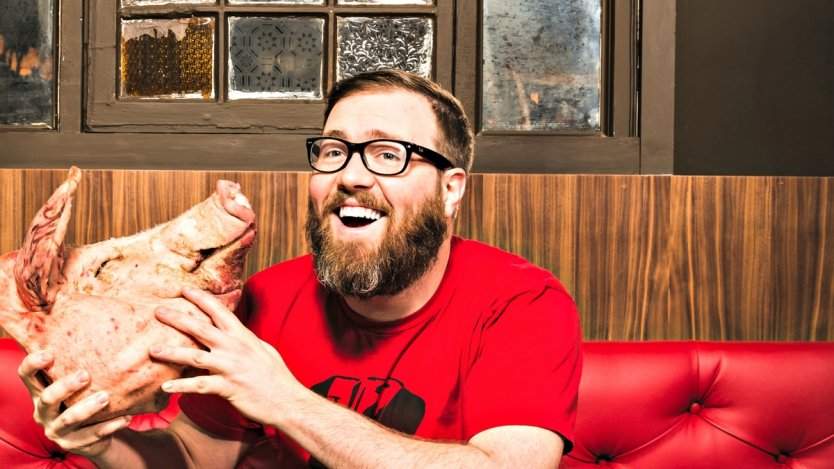After spending his early twenties in Calgary, Alberta, cooking his way around town, Kris Schlotzhauer returned to Toronto four years ago to fully immerse himself in the ever-changing food scene that can either eat you up and spit you out, or give you a little room to make a name for yourself. Luckily, with heading up the kitchen at the popular restaurant Enoteca Sociale, he's been the latter.
Here, Schlotzhauer talks about what it was like to be part of the opening team of what is now one of the most well-known restaurants in Canada, what Toronto's food scene offers that most others don't, his beef with beef and a lot more.
Was cooking always in your blood?
I grew up in Stratford, Ontario, which is a big tourist destination. In that town, you would either work in a festival during the summertime or you'd work in one of the restaurants. To a 13 year old boy, a kitchen could seem pretty attractive; it's certainly not your average workplace. I got my first job dishwashing and just fell in love with kitchens. I went to bussing from there, then became a cook and briefly tried my hand at serving, but I lasted about two weeks. Then I went to college, but I always had part-time jobs working in kitchens, even though I was pursuing other careers.
Initially, I worked as a sale rep in the healthcare field, selling medical equipment. I always had that itch to work in a kitchen. To be honest, before that, I had never really thought of it as a career. I mean, when I was growing up, no guidance counsellor would ever say to a high school student, "Hey, you know what? You should become a chef!"
So, you got back into it, working at a few restaurants before you joined the opening team at Charcut?
Yeah, I had just finished up my apprenticeship at Petite and actually right before that I was at Jaro Blue. Every restaurant I had ever worked at in Calgary, with the exception of Charcut, is now closed!
Charcut was just opening back then. It opened in February of 2010 and I stayed working there for two years before going back home to Ontario.
What was it like working there during the restaurant's rise to the limelight, nationally?
I think those first two years were really special times. We started off really strong: there was Top Chef Canada [for Connie], then the enRoute Best New Restaurant placing and everything just kind of snowballed. It was definitely a crazy couple of years. That was also the first time I saw the true power of social media coming from a restaurant. Before that, I don't think many people knew that yet, what it could do, and John Jackson knew. There was something about social media that could be special, especially for restaurants. Food television, too, was picking up speed and the whole celebrity chef thing. People started becoming really interested in what was happening behind the scenes in restaurants, and Twitter, Instagram and all of that gave people a peek into the restaurant world without having to physically work there.
Why do you think experiencing food scenes west of Ontario isn't of much interest to people?
First off, I love Calgary. It's a great city and I'm constantly defending it here in Toronto. [Some] people have never been, but they have their preconceived notions about it. I think Montreal has always been a very attractive city to visit. You can easily go there for the weekend and come back. Toronto itself has such a huge scene that a lot of people don't venture very far from it. There are so many things happening here that it can be hard to keep up with what's happenings in our own city, let alone in other major cities across the country. That said, I think you can learn a lot from independent restaurants anywhere, whether that's Saskatoon, Vancouver, or Calgary.
Vancouver is probably top tier in terms of vegetable-forward menus and seafood, and Calgary has gastropubs down pat. What does Toronto do best right now?
Toronto is such a culturally dynamic city, so you're starting to see--Ok, "fusion" was a dirty word five years ago and it's kind of been rebranded now. Here, you see it everywhere. Odd Seoul does this Korean-meets-American food thing, Patois is Jamaican/Chinese/Canadian cuisine. That's really unique and something you don't see a lot in other places. One of my favourite new restaurants is called Borealia. They are doing these old heritage Canadian recipes from original settlers or ones that have Aboriginal roots and fusing some Asian flavours with them. It's just really cool. No one else is doing anything like that.
What is something you used to use a lot in your cooking in Calgary, but don't have the opportunity to in Toronto? And vice versa?
One that I would use all of the time is Highwood Crossing's cold-pressed canola oil. There is a company that has started doing cold-pressed here now, but Highwood just makes such a great product. That and the Brassica mustard from Alberta, too!
For me, it was always tough to get really fresh, good quality seafood in Calgary. Here, there are a few different places that bring in such fantastic stuff. In Toronto, transportation can be so easy. Something can be caught on the East or West Coast in the morning and arrive at your restaurant by the afternoon.
What do you think about all the talk that's going on with labour conditions and staffing issues in restaurants across North America?
It's pretty tough. I think a bit of it is our fault for not being able to attract people to the industry. Whether it's the wage issue, tough working conditions or long hours, these things are not attractive to young people looking to join the workforce. You're not going to get benefits, you're going to only get paid $13, work 60 hours a week and do that for five years before you even have a chance to move up. That is not an attractive job description, and we're seeing now that it's not sustainable either. I see a big change coming. There is a solution out there, I'm not 100 per cent sure what it is. People might just have to be willing to pay a little bit more, so restaurants can pay their employees a little bit more. A lot of people think that most restaurants make a lot of money, but the reality is that most of them don't. Most are operating on pretty small margins, not making millions of dollars a year.
In addition to labour, what else can really impact the price of a menu item in your restaurant?
We try to keep our prices down, but every now and again you have to raise them because food costs go up. One of the most difficult things that's happened in the last little while has been trying to keep beef dishes on the menu because its cost has just sky-rocketed. Beef [price] has risen almost 70 per cent in the past six or so months. People still really, really want to eat it, but it's hard to make it affordable. I don't think you should have to spend a month's salary on dinner, but there are a lot of working parts that go into making a restaurant meal. It's hard to charge what you have to and make people OK with that.
Is that what you think drives chefs to discover or utilize less popular ingredients?
Yeah, maybe, but beef is beef. Most people are not going to stop eating beef. It's such a part of our culture and of our lives. I'd say some of the busiest restaurants in Toronto would be steakhouses and that [craving for beef] is never going to go away.













